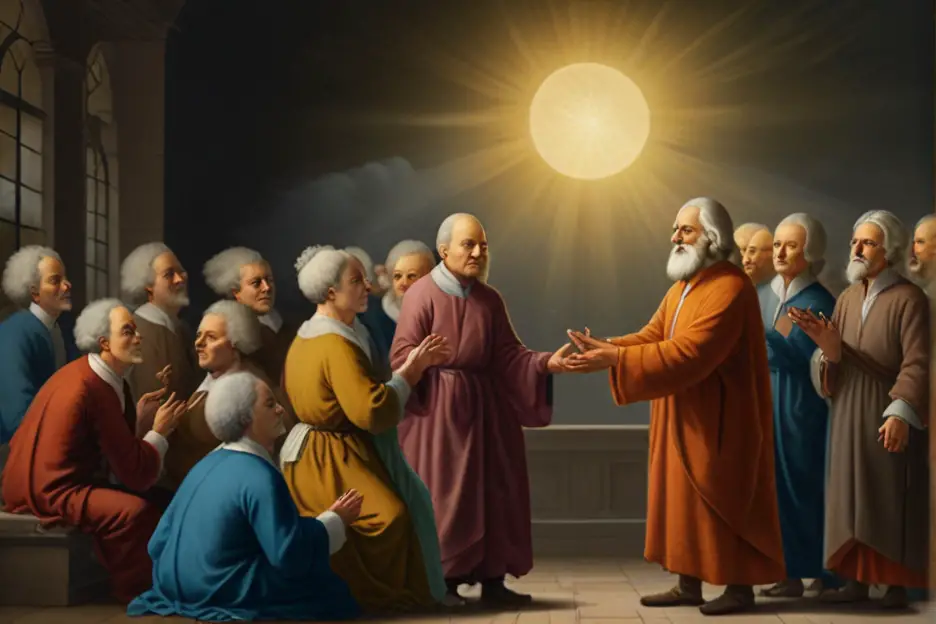
The Age of Enlightenment, a period of intellectual and cultural growth in the 17th and 18th centuries, brought about significant changes in government, science, and society.
In this blog post, we will explore how the Enlightenment challenged traditional authority, advanced scientific progress, and influenced societal norms, leaving a lasting legacy that continues to shape our world today.
The Impacts on Government and Politics
The Enlightenment period had profound impacts on government and politics, challenging established authority and paving the way for the rise of democratic ideals.
Here’s a closer look at how Enlightenment ideas reshaped the political landscape:
- Read also: The Age of Enlightenment vs. the Scientific Revolution: A Tale of Two Revolutions
- Read also: From Fall to Rise: Exploring the Major Events of the Middle Ages
Challenge to authority
Enlightenment thinkers questioned the traditional notion of the divine right of kings and absolute monarchies, which asserted that rulers derived their authority directly from God.
Instead, they championed the rights of individuals and advocated for limits on governmental power.
This shift in perspective laid the groundwork for a more democratic approach to governance, where power was derived from the consent of the governed rather than divine decree.
Rise of democracy
Influential philosophers such as John Locke and Montesquieu played pivotal roles in shaping democratic ideals during the Enlightenment.
Locke’s concept of natural rights, including life, liberty, and property, underscored the idea that government exists to protect the rights of individuals.
Montesquieu’s theory of the separation of powers advocated for the division of governmental authority into distinct branches—legislative, executive, and judicial—to prevent tyranny and safeguard liberty.
These principles formed the basis of modern democratic systems, emphasizing the importance of accountability, checks and balances, and the rule of law.
American and French revolutions
Enlightenment ideas ignited revolutions in both America and France, challenging existing systems of government and inspiring movements for liberty, equality, and self-government.
In the American colonies, Enlightenment principles fueled the desire for independence from British rule, leading to the Declaration of Independence and the establishment of the United States as a democratic republic.
Similarly, in France, Enlightenment ideals contributed to the overthrow of the monarchy during the French Revolution, paving the way for the rise of democratic institutions and the proclamation of the Declaration of the Rights of Man and of the Citizen.

The Impacts on Scientific Progress
The Enlightenment era heralded significant shifts in scientific progress, fundamentally altering the way humanity approached the study of the natural world.
Here’s a closer examination of how the Enlightenment impacted scientific inquiry.
Shifting focus
Central to the Enlightenment was a newfound emphasis on scientific observation and experimentation, eclipsing traditional explanations rooted in religion or superstition.
This marked a departure from the prevailing worldview that attributed natural phenomena to divine intervention or mystical forces.
Instead, Enlightenment thinkers advocated for empirical evidence and rational analysis as the basis for understanding the universe.
Scientific breakthroughs
The Enlightenment era witnessed a surge of scientific breakthroughs and discoveries that reshaped our understanding of the natural world.
One of the most notable figures of this period was Isaac Newton, whose laws of motion and theory of universal gravitation revolutionized physics and laid the foundation for classical mechanics.
Moreover, advancements in biology and medicine, fueled by pioneers such as Carl Linnaeus and William Harvey, expanded our knowledge of the human body and the diversity of life on Earth.
Scientific method established
A hallmark of the Enlightenment was the establishment of the scientific method as a systematic approach to inquiry and discovery.
This methodological framework emphasized empirical observation, hypothesis testing, and peer review as essential components of scientific investigation.
By adhering to rigorous standards of evidence and logical reasoning, Enlightenment thinkers sought to uncover the underlying principles governing the natural world.

The Impacts on Society and Culture
The Enlightenment era left an indelible mark on society and culture, ushering in profound changes that continue to influence our world today.
Let’s explore the impacts of the Enlightenment on society and culture in more detail:
Focus on education
Enlightenment thinkers placed a high value on education and the pursuit of knowledge.
They believed that an educated populace was essential for the progress of society and the advancement of human understanding.
As a result, the Enlightenment era saw significant reforms in education systems, with an emphasis on promoting literacy and critical thinking skills.
Schools and universities were established or reformed to provide accessible education to a broader segment of the population.
Social contract theory
Central to Enlightenment philosophy and political theory was the concept of the social contract.
This idea posited that individuals voluntarily surrender some of their natural freedoms in exchange for the protection and benefits provided by society and government.
Thinkers such as Thomas Hobbes, John Locke, and Jean-Jacques Rousseau explored variations of the social contract theory, each contributing to the development of modern political thought.
The concept of the social contract underscored the importance of consent and accountability in governance, challenging the legitimacy of absolute monarchy and paving the way for democratic principles of government by consent of the governed.
Art and literature
Enlightenment ideals exerted a profound influence on art, literature, and philosophy, shaping cultural expression and discourse during the era.
Artists, writers, and philosophers embraced the principles of reason, individualism, and social commentary in their works, reflecting the intellectual currents of the time.
Figures such as Voltaire, Rousseau, and Denis Diderot produced influential literary and philosophical works that critiqued established institutions, championed individual rights, and advocated for social reform.

- Read also: Renaissance Religion Facts: How Religion Ignited a New Era
- Read also: Unveiling the Mysteries: Exploring Medieval Era Facts and Beyond
A Legacy of the Age of Enlightenment
The Age of Enlightenment, a period marked by intellectual curiosity and critical thinking, has left an enduring legacy that resonates in various aspects of our contemporary world.
Its influence can be observed in the realms of democracy, human rights, scientific exploration, education, and cultural expression.
Through its bold questioning of established authority, promotion of scientific inquiry, and advocacy for social and cultural change, the Enlightenment has laid the foundation for many of the principles and values that shape our modern society.
- Democracy and human rights: The Enlightenment challenged the notion of absolute monarchy and divine right, advocating instead for the principles of democracy and human rights.
- Scientific inquiry: This emphasis on scientific inquiry revolutionized our understanding of the natural world and laid the groundwork for modern science.
- Education: It led to the establishment of educational institutions and the promotion of literacy among the general population.
- Cultural expression: Enlightenment ideals also influenced cultural expression, inspiring artistic and literary movements that championed reason, individualism, and social reform.
Final Words
The Age of Enlightenment, with its emphasis on reason, science, and individual liberty, left an indelible mark on the world.
It challenged traditional authorities, sparked revolutions, and ushered in a new era of scientific discovery.
While the Enlightenment wasn’t without its limitations, its core principles continue to resonate today.
We see its influence in modern democracies, scientific inquiry, and the ongoing pursuit of human rights.
The Enlightenment may have dimmed centuries ago, but the light it ignited still illuminates our path towards a more just and rational world.pen_sparktunesharemore_vert
FAQs
The Enlightenment promoted ideas of individual rights, separation of powers, and the rule of law, which are foundational principles of modern democratic societies.
Enlightenment thinkers emphasized observation, experimentation, and the scientific method, leading to significant advancements in various fields of science.
The Enlightenment valued education and knowledge, leading to reforms in education systems that promoted literacy, critical thinking, and the dissemination of knowledge to a wider audience.


